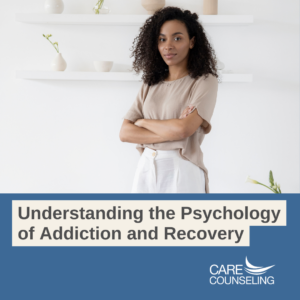Understanding the Psychology of Addiction and Recovery
 Addiction is a complex and pervasive issue that affects millions of individuals and their loved ones worldwide. While addiction can seem insurmountable, understanding the psychology behind it is the first step toward recovery and healing. In this blog post, we will delve into the intricate world of addiction, exploring its psychological underpinnings, and examining the journey of recovery.
Addiction is a complex and pervasive issue that affects millions of individuals and their loved ones worldwide. While addiction can seem insurmountable, understanding the psychology behind it is the first step toward recovery and healing. In this blog post, we will delve into the intricate world of addiction, exploring its psychological underpinnings, and examining the journey of recovery.
The Psychology of Addiction
- Neurological Changes:
Addiction is often characterized by significant neurological changes in the brain. Repeated exposure to substances like drugs or alcohol can alter the brain’s reward system, leading to the intense cravings and compulsive behaviors associated with addiction.
- Reward Pathway:
The brain’s reward pathway, primarily the release of dopamine, plays a central role in addiction. Dopamine is a neurotransmitter associated with pleasure and reward. When a person consumes a substance or engages in a rewarding behavior, the brain releases dopamine, reinforcing the desire to repeat that action.
- Tolerance and Withdrawal:
Over time, as the brain becomes accustomed to the presence of the addictive substance, tolerance develops. This means that more of the substance is needed to achieve the same effect. When the substance is withheld, withdrawal symptoms can occur, intensifying the cycle of addiction.
- Cravings and Triggers:
Environmental cues, stress, or emotional triggers can induce powerful cravings in individuals with addiction. These cravings can be overwhelming and contribute to relapse.
- Psychological Factors:
Underlying psychological factors, such as trauma, stress, depression, or anxiety, often contribute to the development of addiction. Substance use may initially serve as a coping mechanism for these underlying issues.
The Stages of Addiction
- Experimentation:
Many individuals begin with experimentation, trying a substance out of curiosity or peer pressure.
- Regular Use:
Regular use follows experimentation, with individuals using the substance more frequently, often seeking the pleasurable effects.
- Risky Use and Harm:
In this stage, individuals may engage in risky behaviors associated with substance use, such as driving under the influence or neglecting responsibilities. Harm to physical and mental health becomes more evident.
- Dependence and Addiction:
Dependence occurs when the brain and body become reliant on the substance, leading to withdrawal symptoms when it is not used. This stage often signifies full-blown addiction, characterized by an inability to control use despite adverse consequences.
Recovery and the Psychological Journey
Recovery from addiction is a deeply personal and challenging journey that involves physical, psychological, and emotional healing. It requires a multi-faceted approach and often involves the following key elements:
- Acknowledgment and Acceptance:
The first step in recovery is acknowledging the addiction and accepting the need for help. This can be a profoundly difficult but transformative moment.
- Detoxification:
For many substances, detoxification is the initial phase of recovery. It involves safely managing withdrawal symptoms under medical supervision.
- Therapy and Counseling:
Therapy and counseling play a vital role in addressing the psychological aspects of addiction. Cognitive-behavioral therapy (CBT), motivational enhancement therapy (MET), and support groups like Alcoholics Anonymous (AA) are commonly utilized.
- Relapse Prevention:
Relapse is a common part of the recovery journey, but it can be prevented or minimized through effective relapse prevention strategies and coping skills.
- Rebuilding Relationships:
Addiction often strains relationships. Recovery includes rebuilding trust and fostering healthy connections with loved ones.
- Addressing Co-Occurring Disorders:
Many individuals with addiction also struggle with co-occurring mental health disorders like depression or anxiety. Integrated treatment approaches address both addiction and underlying mental health issues.
The Importance of Support
Support from family, friends, and support groups is invaluable during the recovery process. Knowing that one is not alone and that there is a network of individuals who understand and care can provide the strength and motivation needed to persevere.
Addiction is a complex interplay of neurological, psychological, and environmental factors. Understanding the psychology behind addiction is crucial for both individuals affected by addiction and those supporting them. Recovery is possible, and it often begins with acknowledging the problem, seeking professional help, and building a strong support system.



























